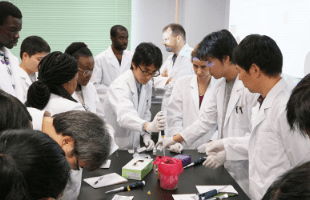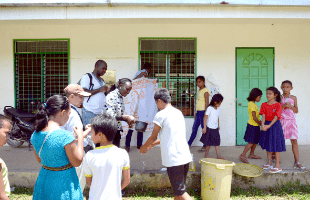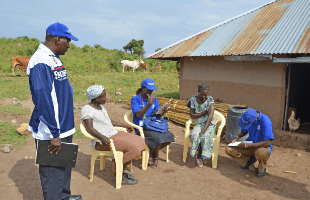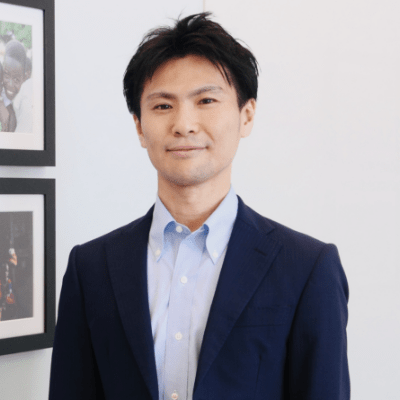

Year 1 and 2
WISE Coursework for Global Health
Main Modules
- Tropical Medicine
- Epidemiology/ Statistics
- Global Environment and Health
- Health Policy/ Management
- International Community Health
- Social/ Behavioral Science
In addition to the main curriculum of the respective department, students must register for at least one of the above main modules.
Coursework up to the second year is based on the TMGH modules. It is built on the foundation of LSHTM teaching materials and lectures. Students acquire advanced knowledge and skills through the “WISE Coursework for Global Health” that meet the requirements of the programme.
Involvement in research projects (namely, international collaborative research in Africa and Asia) will encourage students to establish a foundation of knowledge and technology and acquire international communication skills and practical expertise.
Nagasaki University conducts a strict qualifying examination to ensure the academic excellence. An "Upgrade examination" will be conducted at the end of the second year; however, students who were unable to meet the required standard, may not be able to continue and complete the course.
Nagasaki University conducts a strict qualifying examination to ensure the academic excellence. An "Upgrade examination" will be conducted at the end of the second year; however, students who were unable to meet the required standard, may not be able to continue and complete the course.
-
 Distinctive coursework to attain an excellent level of academic knowledge and skills
Distinctive coursework to attain an excellent level of academic knowledge and skills -
 Quality assured by monitoring and evaluation of students through upgrade exams at the end of year 2
Quality assured by monitoring and evaluation of students through upgrade exams at the end of year 2
Year 3, 4, and 5
WISE Research Module for Global Health
"Team Supervision"
・Clearly set practical objectives and problem-solving research guidance
・Students will receive high quality research guidance while participating in international collaborative research conducted jointly with partners such as LSHTM.
・Students will receive high quality research guidance while participating in international collaborative research conducted jointly with partners such as LSHTM.
WISE Research Module for Global Health will be provided from year 3 onwards. Students will receive "Team Supervision", consisting of three or more world-class researchers chosen from Nagasaki University and both domestic and international research institutions.
The module will focus on research work that offers students an environment to engage in research activities that cross boundaries, disciplines, and the public and private sectors. Students are expected to pass the Qualifying Examination at the end of years 3 and 4, in order to carry out research as a WISE Programme student.
The module will focus on research work that offers students an environment to engage in research activities that cross boundaries, disciplines, and the public and private sectors. Students are expected to pass the Qualifying Examination at the end of years 3 and 4, in order to carry out research as a WISE Programme student.
-
 Receive world-class research guidance under team supervision by participating in international collaborative research
Receive world-class research guidance under team supervision by participating in international collaborative research -
 Opportunities for involvement in a multisectoral research environment
Opportunities for involvement in a multisectoral research environment
NU WISE Programme Flow
-

NU WISE Programme students
Students on the WISE Programme : Students will be selected by the TMGH Graduate School Entrance Examination (Intake quota of approx. 8 students) -

Candidates for the NU WISE Programme
Candidates for the NU WISE Programme : Students belonging to the Graduate Schools of Global Humanities and Social Sciences; Engineering; Fisheries and Environmental Sciences; Biomedical Sciences; and the School of Tropical Medicine and Global Health, who are recommended by the dean of that graduate school and are subsequently approved by the NU WISE Programme Steering Committee.
Eligibility
| year 1 | ||
|---|---|---|
| year 2 | ||
| year 3 | ||
| year 4 | ||
| year 5 | ||
Produce truly outstanding global health professionals who can make a healthier world
Entrance Examination
At the end of year 1
Follow up based on coursework grades(※Students on a 4 year doctoral course will transfer from year 2)
At the end of year 2
Upgrade Examination
At the end of year 3
Qualifying Examination1
At the end of year 4
Qualifying Examination2
At the end of year 5
Thesis screening and final exam
Thesis Qualifying Examination Panel
・Nagasaki University Faculty
・Prominent Researchers centering on our partners
・External examiners actively leading their field
Message from students

